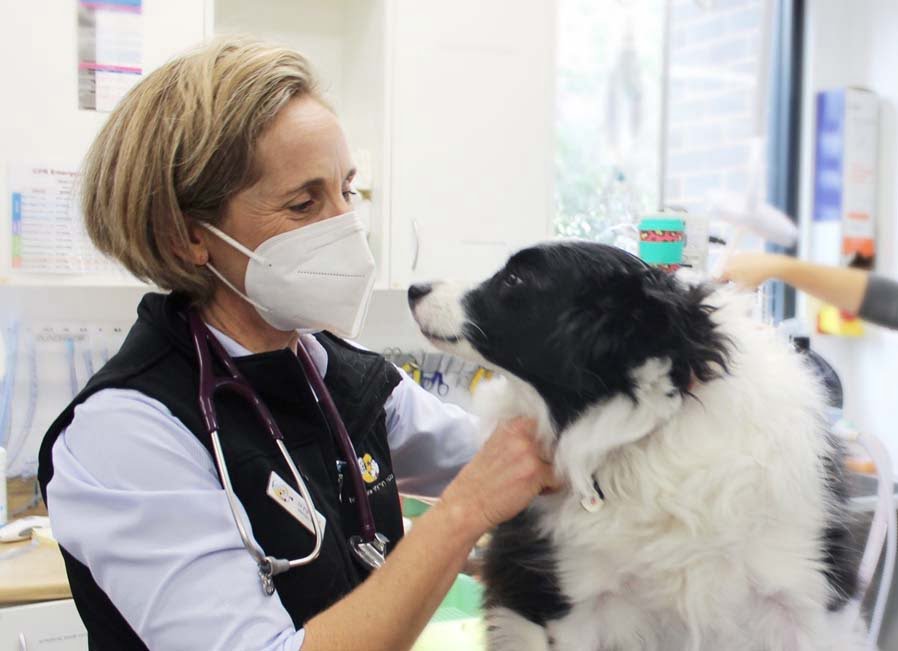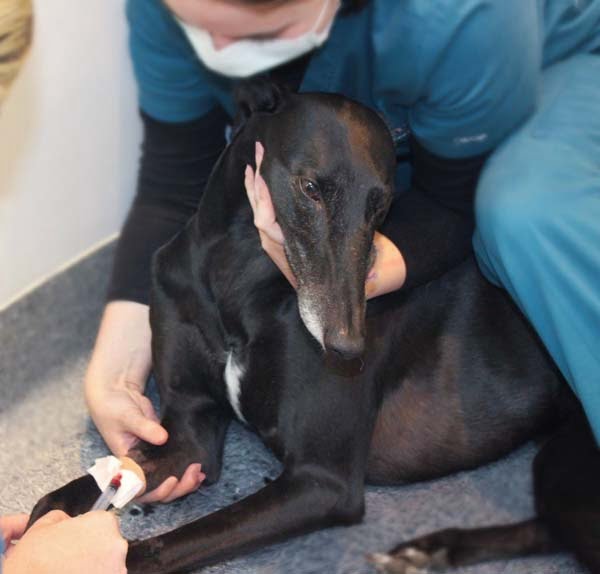A Turramurra Vet Pet Care Article
Anti-anxiety Medication for Trips to the Vet

Anti-anxiety Medication for Trips to the Vet
by Freya Britt-Lewis, Pet Health Care Writer and Dr Gretta Howard, Senior Veterinarian
(Lead photo: Dr Pip Wines conducting a consultation with one of her favourite dog breeds – the Border Collie!)
Did you know that some pet owners will avoid veterinary visits altogether due to their pets experiencing fear, anxiety and stress whilst there?
As pet owners, we often bring our pets to the vet for routine vaccinations and a myriad of physical ailments. An often-overlooked component of pet welfare is their mental health, including fear, anxiety and stress.
When your pet attends Turramurra Veterinary Hospital, their anxiety levels will play a role in how your pet feels about coming to the vet and also whether a complete physical examination and diagnostic testing can be accomplished without sedation.
While the majority of cats tolerate blood collection, for a very anxious cat, taking blood could prove to be difficult without sedation. On the other hand, a fearful dog, can manifest their fear as aggression, which is potentially dangerous during physical examination or blood collection.
In these cases, medicating your pet with anti-anxiety medication prior to arrival at the clinic, could be a solution your veterinarian recommends.
Could anti-anxiety mediation benefit my pet?
Some pet owners can be nervous about introducing psychotropic medications, but it is important to realise that high levels of fear, anxiety and stress can have a negative effect on your beloved pet.
Elevated stress hormones can suppress the immune system and even influence pathology results.
Each time your pet is exposed to a stressful situation, they will learn to associate that event with feeling anxious. If left untreated, these feelings of fear will become more intense and start earlier as your pet learns to anticipate the fearful event.
Fear can also lead to fear-aggression if they feel threatened, even if the threat is unfounded. Animals will sometimes instinctively react aggressively when they are scared. This may lead to dangerous situations. In the case of your pet being sick or injured in an emergency, this can severely limit your veterinarian’s ability to provide prompt medical care.
If your pet is showing signs of severe anxiety at the vet, then anti-anxiety medications can reduce this panic response and allow your pet to feel more relaxed and comfortable being examined.
The welfare of our patients is paramount and while sometimes fear is unavoidable, part of a vet’s duty of care is to mitigate it as much as possible.
If you think your pet could benefit from anti-anxiety medication prior to fear-inducing events (such as a veterinary visit), then please let us know so that we can assist your pet as soon as possible.
What happens if my pet remains fearful despite giving anti-anxiety medication?
Medications given at home may not have a sufficient effect for the veterinarian to do everything required, but can often allow them to inject sedatives quickly and easily, without your pet feeling as stressed as if they didn’t have the anti-anxiety medication already on board.
 With an anxious animal, anti-anxiety medication given prior to a veterinary consultation or procedure can allow further sedation (if required) to be administered quickly and effectively without your pet feeling as stressed.
With an anxious animal, anti-anxiety medication given prior to a veterinary consultation or procedure can allow further sedation (if required) to be administered quickly and effectively without your pet feeling as stressed.
For non-urgent cases, the dose may need to be increased or a different medication trialed to ensure it is having the intended positive effect.
What medication can we use?
There are a variety of medications that can be utilised to ease your pet’s anxiety during a veterinary consultation. Like with people, medication will work differently on each individual pet, so your veterinarian may need to trial a couple of different combinations before finding the perfect fit.
Short-acting anti-anxiety medications can also be used in cases of separation anxiety, noise phobias (such as fireworks and thunderstorms) and travel, in addition to veterinary visits and hospital stays.
If your pet suffers from generalised anxiety rather than situational anxiety, then long term psychotropic medication may be required on a daily basis. A veterinary behaviour consultation should be organised to discuss your pet’s needs and to obtain a diagnosis with your vet.
Should my pet have a veterinary behaviour consultation?
Sometimes pets with high anxiety at the vet can have similar levels of anxiety in the home or out and about. Either way, we recommend starting with a veterinary behaviour consultation to properly assess and address your pet’s behaviour condition. This can be conducted as a face-to-face consultation with your pet, or if your pet is too anxious to come in, we can start with a telehealth consultation and work out a plan from there.
Our veterinary team work closely with our Pet Behaviour Consultant, Katie Bedrossian, who we will sometimes refer you to for a detailed environmental modification plan.
Remember, pet health does not just include routine preventatives, vaccinations and physical ailments, but also their mental well-being. Your pet’s quality of life depends on it.

